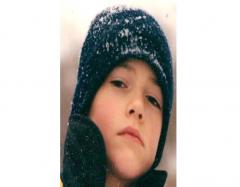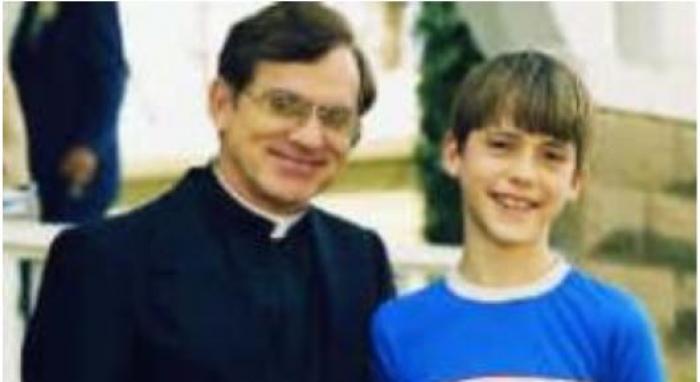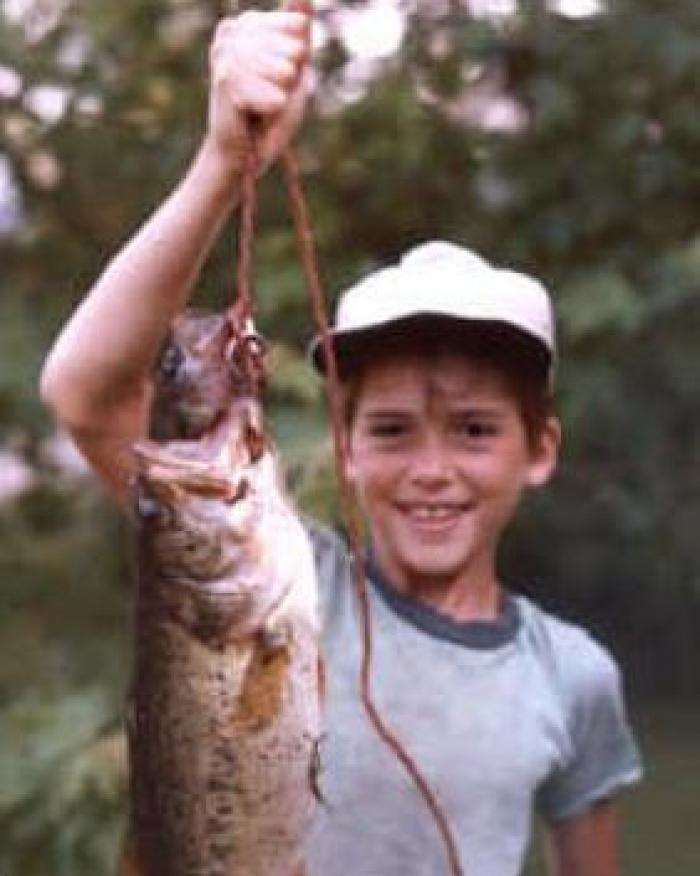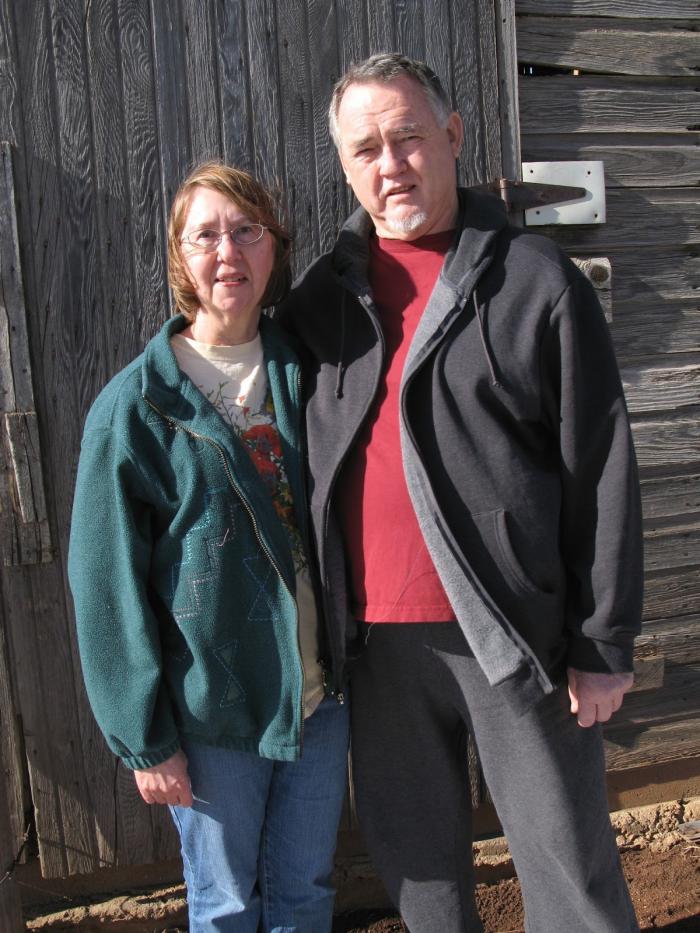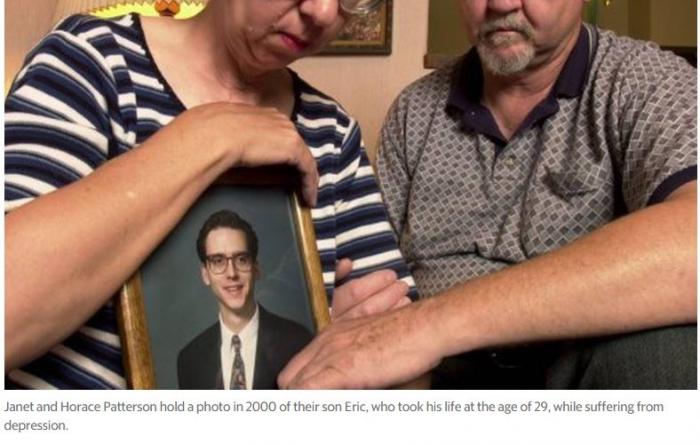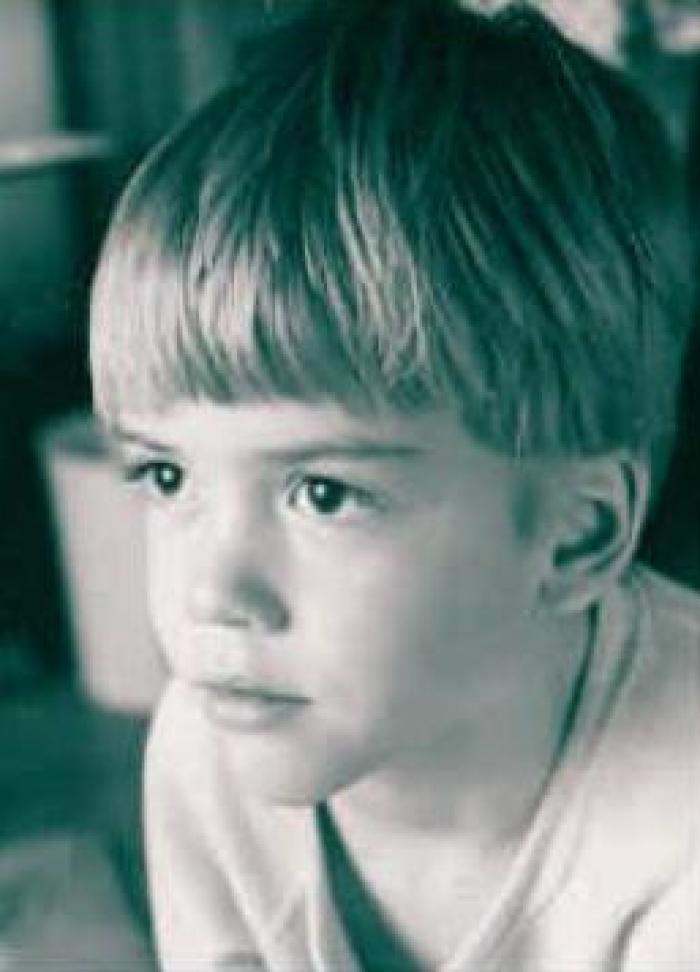My Son, Eric Patterson, Killed Himself Because a Catholic Priest Sexually Abused Him at Age 12
By Janet Patterson
The following commentary is written by Janet Patterson, whose son Eric Patterson (1970-1999) reportedly was sexually abused multiple times by Rev. Robert K. Larson. Larson spent 5 years in jail for sexually abusing altar boys and died in 2014 at the age of 84; Eric Patterson died at age 29 after shooting himself in the head. Clergy abuse expert Dr. Leon Podles estimates there have been between 100,000 and 200,000 clergy abuse victims since 1950 in the United States alone, and possibly up to 2,000,000 victims worldwide. I stood there, rooted to the spot, stroking my son’s hair, gently touching his cold face, gazing at my precious child. “Eric,” I thought, “oh, Eric.” Then I turned to walk down the church aisle as the funeral attendants closed the casket. Numb from shock, I joined the rest of my family, clutching my husband’s hand tightly, feeling his arm caressing my shoulder. Now, three years later, I am sitting at Eric’s computer, the one on which he typed his suicide note, painfully recalling the series of events that culminated in his death. Slowly, painstakingly, our family grapples with the awful truth—our son was sexually abused at the age of 12 by our parish priest.
How could this be? Sexual abuse happens to someone else’s child, in someone else’s family, not ours. Then reality hits. My mind constantly reconstructs the details of Eric’s life; sifting and sorting through memories, wondering what clues I missed, what behavior I didn’t understand at the time. Why, during high school, did he refuse to be confirmed? When I questioned him about his decision, he replied that he didn’t even know if he believed in God. He could not receive this sacrament, he felt, unless he was making a heart-felt commitment. Why, the night of his junior-senior prom, did he drive for hours on the interstate, not arriving home until seven the next morning? Tearfully, he told us that he had wanted to keep driving forever. When asked what was troubling him, he couldn’t tell us. I sensed he was in distress, but felt powerless. As he continued his junior year, he seemed better, so I relaxed, believing that this episode was one of many crises most adolescents go through. Why, his junior year in college, did he wreck his car as he rounded a curve too fast, hitting some trees?
I drove to meet Eric that morning, and we talked for hours in a park close by. Slowly, painfully, Eric revealed that he couldn’t eat, couldn’t sleep, that his life seemed out of control. Realizing he was suicidal, I immediately made him an appointment with a psychiatrist for evaluation. After being placed on an anti-depressant, Eric seemed confident and focused. Shortly after this, he did a complete turnabout, embracing Catholicism fervently. Daily holy hours, weekly visits to a nursing home, teaching 5th grade CCD, writing to a prisoner in Texas, continuing his pro-life activities, attending a weekly Bible study group on campus, getting confirmed—all these actions filled him with hope and enthusiasm.
Easter weekend, he proudly announced to us that he wanted to become a priest. In my heart I knew he would be a good priest, caring, intelligent, and faithful to our Lord’s teachings. After graduation, he headed to the East Coast as a candidate for a seminary program. He wrote letters telling of his feeling that this was truly where he belonged. The night before he was to fly home for a short visit, the director asked him to wait in a room, that he needed to talk to him. After waiting three hours, shortly before midnight, Eric was told that he was not being accepted, that he was to take everything with him the next day, and not to tell anyone there that he would not be returning. On the way home from the airport, Eric stunned us by saying, “They didn’t want me.” My heart lurched, my mind reeled, alternating between anger and disbelief. He was given no explanation, he said, but told us that God must want him somewhere else.
Over the next few days, I watched as parishioners asked Eric where he would be studying for the priesthood. Bravely, he told each one, “They didn’t want me,” leaving them puzzled and surprised. After Eric’s death, while going through a box containing his papers, I found a paper dated a few days before his departure from the seminary. At the top of a detailed set of notes in blue ink, he had his perpetrator’s name written in red. Evidently he had revealed his sexual abuse, leading to his rejection by the seminary. How much pain he must have gone through, finally confiding his painful secret, only to be turned away so callously. But he continued trusting in the Lord, continued teaching CCD, and making holy hours. A few months later, Eric took a teaching position at a Catholic preparatory school two hundred miles from home. Fluent in Spanish, he taught English as a Second Language, Spanish, and religion. After over a year teaching, he had begun fasting, unknown to us, evidently trying to please God and to have a sense of control over his life. By the time we realized that Eric was in trouble physically and mentally, he weighed only about 170 pounds, far too thin for his 6 feet 8 inch height. Entering a hospital psychiatric unit, he attempted to combat his anorexic condition and battle with his psychotic depression. Asked if he had ever been sexually abused, he denied that he had. His psychiatrist was troubled by Eric’s illness, sensing that the root cause had yet to be discovered.
Over a month later, Eric returned home, where we cajoled him to eat and to drink, as he had no desire to do so. Eventually, with medication, he grew stronger and healthier. For the next three years, he was a successful computer salesperson, receiving gratitude from his many customers for his courteous, professional help. Once more, however, his weight began to plummet. Fearing hospitalization, he attempted to regain control of his life by going back on his medication. Deeply troubled, he sobbed uncontrollably one night in our living room, his best friend beside him. He dreaded hospitalization, but we succeeded in getting him admitted for treatment. At a different hospital this time, he had the good fortune of having the same psychiatrist. She was convinced there was a missing link, that some unknown cause lay at the root of his illness. Two days later, when Becky, Eric’s older sister, visited him in the ward, she told him that we hated his idea of God, a vengeful God Who could never be pleased. We viewed Him as a loving and merciful God.
Asking him if he always felt that way about God, she was surprised at his answer, “No, it all changed when I was twelve.” Then he revealed his molestation but didn’t wish to talk about it in detail. Becky consulted with his nurse, sensing that this revelation was crucial to her brother’s recovery. Later, the nurse found Eric in his room, beating his head on the floor and against the sink. After putting him in full -body restraint, the staff heavily sedated him and placed him on suicide watch. A sexual-abuse therapist began sessions with Eric, and we were hopeful that healing could begin with his long-buried secret finally exposed. He returned home about six weeks later, eventually resumed his job, and decided to move in with a friend from work. A little more than eight months after he disclosed his sexual abuse, Eric left work one Friday with no explanation, sat on the porch of his friend’s house smoking a cigarette, and then sometime that afternoon placed a gun to his head. When his friend arrived home from work, he was faced with a nightmarish scene. The police could find no suicide note, but acting on a hunch, Eric’s friend went to his computer, searched among his files, and discovered one entitled “Hope.” Dated six days before his death, the note revealed Eric’s intense struggle to please God, yet always falling short of His expectations. With that, our handsome, intelligent, compassionate son was gone. Now, three years later, I feel compelled to tell his story. As a grieving mother, I beseech those who read this to risk facing the true brutality of clergy sexual abuse. Abuse victims are all around us—they are our sons, daughters, grandchildren, fathers, mothers, sisters, brothers, husbands, wives, and friends. Please pray fervently that survivors may be treated with understanding, acceptance, and love. Let your diocese know how you feel about the clergy sexual abuse scandal. Be willing to support survivors in their difficult task of recovery. Hold diocesan church officials accountable for allowing perpetrators to continue molesting in parish after parish, excusing these actions by saying they received “poor medical advice.” First and foremost should come the needs and safety of children and adolescents. If our Church fails to safeguard our children, where is its moral credibility? As agonizingly painful as this tragedy has been, we cherish every day we had with our son. If avoiding this pain would require never having had Eric in our lives, then I gladly embrace the pain for the honor of being Eric’s mother. ERIC ANTHONY PATTERSON, R.I.P. Sept. 5, 1970 Oct. 29, 1999
|
.
Any original material on these pages is copyright © BishopAccountability.org 2004. Reproduce freely with attribution.
